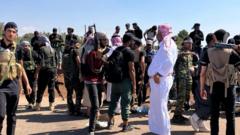The Bedouins have moved to the outskirts of Suweida city, while government forces maintain armed checkpoints, complicating their access to injured fighters left behind. Tensions remain high as both sides have committed acts of violence, raising concerns about the prospect of a sustainable peace in the region, which has seen over 128,000 displaced individuals amid escalating humanitarian crises.
The Bedouin fighters currently observing the ceasefire have indicated a willingness to renew hostilities if their grievances—particularly the release of injured Bedouins—are ignored. Recent reports suggest a fragile calm in the region, with the Druze community regaining control after the interim government intervened.
Amid increasing instability, the humanitarian situation in Suweida remains dire; medical supplies are critically low and conditions for displaced Bedouin families have deteriorated significantly. Authorities and international actors are urged to engage in resolving these tensions and safeguarding stability among the religious groups involved.
Despite the past week's deadly encounters, there remains an undercurrent of hope for coexistence, contingent upon governmental authority and a commitment to peace and security by all parties.
The current scenario in Suweida exemplifies the complexities of tribal and sectarian relations in Syria, necessitating urgent dialogue and reconciliation efforts as communities grapple with the aftermath of violence and displacement.
The situation in Suweida underscores the fragility of peace in the region and the need for stakeholders to address the underlying issues fueling conflict while providing humanitarian assistance to affected populations.
The Bedouin fighters currently observing the ceasefire have indicated a willingness to renew hostilities if their grievances—particularly the release of injured Bedouins—are ignored. Recent reports suggest a fragile calm in the region, with the Druze community regaining control after the interim government intervened.
Amid increasing instability, the humanitarian situation in Suweida remains dire; medical supplies are critically low and conditions for displaced Bedouin families have deteriorated significantly. Authorities and international actors are urged to engage in resolving these tensions and safeguarding stability among the religious groups involved.
Despite the past week's deadly encounters, there remains an undercurrent of hope for coexistence, contingent upon governmental authority and a commitment to peace and security by all parties.
The current scenario in Suweida exemplifies the complexities of tribal and sectarian relations in Syria, necessitating urgent dialogue and reconciliation efforts as communities grapple with the aftermath of violence and displacement.
The situation in Suweida underscores the fragility of peace in the region and the need for stakeholders to address the underlying issues fueling conflict while providing humanitarian assistance to affected populations.



















